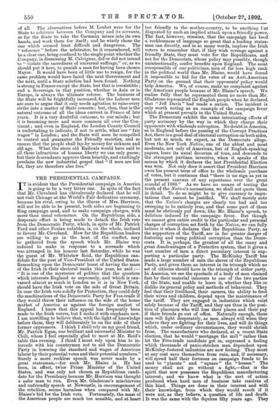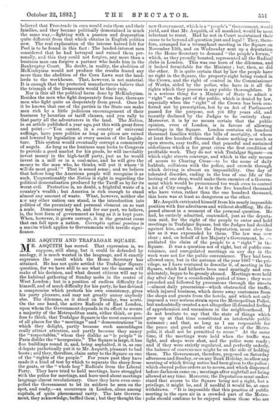THE PRESIDENTIAL CAMPAIGN.
IT is evident that the Presidential campaign in America is going to be a very bitter one. In spite of the fact that Mr. Cleveland has chivalrously declared that he will not visit Chicago at the World's Fair dedication ceremony, because his rival, owing to the illness of Mrs. Harrison, will not be able to be present, both sides are beginning to fling campaign mud, and to make campaign charges, with more than usual vehemence. On the Republican side, a desperate effort is being made to detach the Irish vote from the Democratic Party, which, in spite of Mr. Patrick Ford and other Fenian notables, is, on the whole, inclined to favour Mr. Cleveland. How far the Republican leaders are willing to go in the heat of the conflict, may be gathered from the speech which Mr. Blaine was induced to make in response to a serenade which was arranged in his honour last Saturday, while he was the guest of Mr. Whitelaw Reid, the Republican can- didate for the post of Vice-President of the United States. Remarking upon the Democrats' boast of having the mass of the Irish in their electoral ranks this year, he said :— "It is one of the mysteries of politics that the question which interests England so supremely, and which is can- vassed almost as much in London as it is in New York, should have the Irish vote on the side of Great Britain. In case the Irish vote solidly for Protection, they could defy the machinations of the Democratic Party for Free-trade if they would throw their influence on the side of the home market of America as against the foreign market of England. I know that this appeal has frequently been made to the Irish voters, but I make it with emphasis now. I am unwilling to believe that, with the light of knowledge before them, they will deliberately be on the side of their former oppressors. I think I shall rely on my good friend, Mr. Patrick Egan, our brilliant and successful Minister to Chili, whom I feel especially glad to meet at Mr. Reid's table this evening. I think I must rely upon him to in- tercede with his countrymen not to aid the Democratic Party in lowering the standard and wages of American labour by their potential votes and their potential numbers." Surely a more reckless speech was never made by a great statesman,—for such Mr. Blaine is. He has been, in effect, twice Prime Minister of the United States, and was only not chosen as Republican candi- date for the Presidency because Mr. Harrison was thought a safer man to run. Even Mr. Gladstone's mischievous and unfriendly speech at Newcastle, in encouragement of the rebellion, seems harmless when compared with Mr. Blaine's bid for the Irish vote. Fortunately, the mass of the American people are much too sensible, and at heart too friendly to the mother-country, to be anything 1 ut disgusted by such an implied attack upon a friendly power. The fact, however, remains, that the campaign has bred a recklessness of language so great that a leading states- man can directly, and in so many words, implore the Irish voters to remember that, if they wish revenge against a friendly State, they must vote for the Republicans, and not for the Democrats, whose policy may possibly, though unintentionally, confer benefits upon England. The most irresponsible of our politicians, men of far less high rank in the political world than Mr. Blaine, would have found it impossible to bid for the votes of an Anti-American Party on the ground that their opponents' policy would help America. We, of course, make no complaint against the American people because of Mr. Blaine's speech. We realise fully that he represented them no more than Mr. Gladstone represented the English people when he declared that "Jeff Davis" had made a nation. The incident is only worth noting as an example of the campaign fever which at present prevails in the United States. The Democrats exhibit the same intoxicating effects of party acrimony by the way in which they charge their opponents with wholesale corruption. No doubt in America, as in England before the passing of the Corrupt Practices Act, there is a good deal of electoral corruption on both sides, but not so much, we expect, as the Democrats allege. Even the New York Nation, one of the ablest and most moderate, not only of American, but of English-speaking papers, loses its usual decorum of tone, and descends to the strongest partisan invective, when it speaks of the means by which it declares the last Presidential Election was won. Not only does it assert that President Harrison owes his present term of office to the wholesale purchase of votes, but it continues that "there is no sign as yet in the present canvass of any repentance over the great scandal of 1888." As we have no means of testing the truth of the Nation's accusations, we shall not quote them in detail. To do so might be to give currency-to impu- tations that cannot be justified. We shall merely note that the Nation's charges are clearly too bad and too sweeping to be entirely true, and that some part of them must be obviously put down, like Mr. Blaine's speech, to delirium induced by the campaign fever. But though we cannot give entire credit to the particular and personal charges of corruption set forth by the Nation, we can fully believe it when it declares that the Republican Party, as the supporters of the Tariff, are in far greater danger of fostering and using political corruption than the Demo- crats. It is, perhaps, the greatest of all the many and great disadvantages of a Protective system, that it gives a vast number of men a direct pecuniary interest in sup- porting a particular party. The McKinley Tariff has made a large number of men the slaves of the Republican Party, and given them an interest in its triumph which no set of citizens should have in the triumph of either party. In America, we see the spectacle of a body of men chained fast by their material interests to one of the two parties of the State, and unable to leave it, whether they like or dislike its general policy and methods of behaviour. They feel that their livelihood, their careers, the ability to feed their wives and children, depend upon the maintenance of the tariff. They are engaged in industries which exist solely because of the Tariff, and they are thus in the posi- tion of pla,cemen who will lose their places and their pay if their friends go out of office. Naturally enough, these men will fight desperately, as men always will when they believe they are fighting for their lives, and will do things which, under ordinary circumstances, they would shrink from. The manufacturer who declared, at a recent State election, that he would "mortgage the mill" rather than let the Free-trade candidate get in, expressed a feeling which thousands of panic-stricken men dependent upon McKinley-fostered industries are now feeling. They must at any cost save themselves from ruin, and, if necessary, will spend half their fortunes on campaign funds to be used to " placate " and " square " the "bosses." The money shall not go without a fight, —that is the spirit that now possesses the Republican manufacturing interest; and we know what is the sort of action produced when hard men of business take resolves of this kind. Things are done in their interest and with their knowledge, from which they would revolt if it were not, as they believe, a question of life and death. It was the same with the Squires fifty years ago. They believed that Free-trade in corn would ruin them and their families, and they became politically demoralised in much the same way,—fighting with a passion and desperation quite different from that which obtains in English politics now. The real explanation of the intense hatred felt for Peel is to be found in this fact : The landed-interest men considered that he had betrayed and ruined them per- sonally, and this they could not forgive, any more than a business man can forgive a partner who lands him in the Bankruptcy Court. No doubt, in reality, the abolition of McKinleyism would not produce the results feared any more than the abolition of the Corn Laws sent the land- lords to the workhouse. That, however, is not material. It is enough that the protected manufacturers believe that the triumph of the Democrats would be their ruin. Nor is this all the political harm done by McKinleyism. Besides the men who fight desperately from fear, there are men who fight quite as desperately from greed. Once let it be known that one of the parties in the State can make men rich by a little judicious encouragement of their business by bounties or tariff clauses, and you rally to that party all the adventurers in the land. The Nation, in an article published a year ago, put this with great force and point :—" You cannot, in a country of universal suffrage, have pure politics as long as prices are raised and lowered by legislation at every session of the Legisla- ture. This system would eventually corrupt a community of angels. As long as the business man looks to Congress to provide a good market for his goods, he will inevitably invest money in the high-tariff party, just as he would invest in a mill or in a coal-mine, and he will give the money to the man who, he thinks, will put it where it will do most good.'" That is sound sense; and we believe that before long the American people will recognise it as such. Unquestionably the Nation is right in regarding the political demoralisation produced by the Tariff as by far its worst evil. Protection is, no doubt, a frightful waste of a country's wealth ; but America is rich enough to stand almost any amount of waste. What, however, neither she n.)r any other nation can stand, is the introduction into politics of the pecuniary and personal element on so vast a scale. Democracy may be, and for our part, we believe, is, the best form of government as long as it is kept pure. When, however, it grows corrupt, it is the greatest curse that can fall upon a nation. Corruptio optimi pessima is a maxim which applies to Governments with terrific signi- ficance.







































 Previous page
Previous page